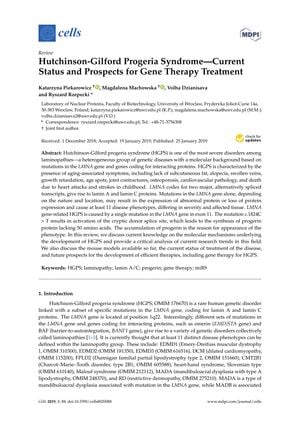TLDR Gene therapy has potential as a future treatment for Hutchinson-Gilford progeria syndrome.
The document reviews Hutchinson-Gilford progeria syndrome (HGPS), a severe genetic disorder caused by a mutation in the LMNA gene, which results in the production of an abnormal protein called progerin. This accumulation of progerin leads to symptoms resembling accelerated aging, such as alopecia, cardiovascular issues, and early death. The review discusses the molecular mechanisms of HGPS, evaluates current research, and examines the available mouse models for the disease. It also assesses the status of treatments and the potential for gene therapy as a future treatment option. The mutation responsible for HGPS is specifically identified as c.1824C > T in exon 11 of the LMNA gene, which affects the splicing of the gene transcript and results in the production of progerin.
32 citations
,
July 2017 in “Oncotarget” Alternating treatment with two drugs could help cells in a rapid aging disease.
48 citations
,
April 2008 in “Human Molecular Genetics” Progerin affects cell shape but not hair or skin in mice.
85 citations
,
March 2008 in “Journal of Cell Science” The mutation causing Hutchinson-Gilford progeria syndrome leads to severe skin problems and early death in mice.
 June 2023 in “GSC Advanced Research and Reviews”
June 2023 in “GSC Advanced Research and Reviews” Hutchinson-Gilford Progeria Syndrome causes rapid aging from a genetic mutation, with no cure but ongoing research into potential treatments.
2 citations
,
June 2018 in “International Journal of Pharmacological Research” Hutchinson-Gilford Progeria Syndrome caused rapid aging due to a genetic mutation, with treatments to manage symptoms.
 January 2018 in “Stem cell biology and regenerative medicine”
January 2018 in “Stem cell biology and regenerative medicine” The nucleus is key in controlling skin growth and repair by coordinating signals, gene regulators, and epigenetic changes.
48 citations
,
April 2008 in “Human Molecular Genetics” Progerin affects cell shape but not hair or skin in mice.
 115 citations
,
October 2009 in “The Journal of clinical endocrinology and metabolism/Journal of clinical endocrinology & metabolism”
115 citations
,
October 2009 in “The Journal of clinical endocrinology and metabolism/Journal of clinical endocrinology & metabolism” The research found that Atypical Progeroid Syndrome has unique symptoms and is not caused by the buildup of a certain mutant protein.



